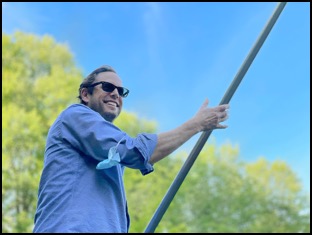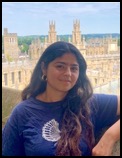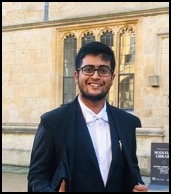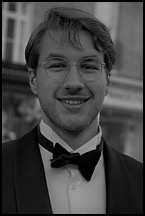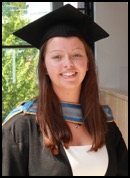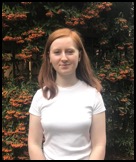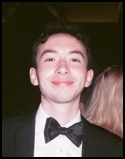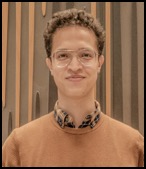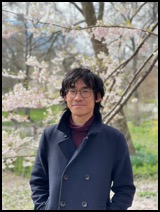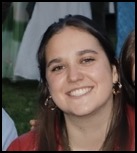Justin is Professor of Biophysical Chemistry at the University of Oxford and Tutorial Fellow in Physical Chemistry at
University College. Justin studied Chemistry at the University of Oxford, as a member of Hertford College. In 2001 he started a PhD in the laboratory of Carol Robinson in the Department of Chemistry at the University of Cambridge. After his PhD he spent a year as an MRC Discipline Hopping Fellow at Birkbeck College, London. Justin was awarded the Norman Heatley Award from the Royal Society of Chemistry and elected RSC Fellow in 2019. He is co-founder of
Refeyn.
Laila graduated in August 2021 with a MSci in chemistry from King’s College London. During her Master’s research project, she investigated the dynamics and inhibition of transmembrane protein AcrA using hydrogen-deuterium exchange mass spectrometry. Laila is now at St Cross College studying for a DPhil with the Benesch group where she will be looking at interaction partners of crypto chromes using mass spectrometry techniques.
Olav graduated with a double bachelor’s degree in chemistry and physics from the University in Tromsø, Norway in June 2021. As part of his chemistry degree he contributed to a project regarding ab initio quantum chemistry simulations using adaptable multitesolution basis sets. He embarked on his DPhil at St Peter's college in October 2021, and has been a part of the group since. Using a combination of empirical methods, most notably charge detection mass spectrometry, and mathematical modelling, his work now focuses on the connection between the quaternary structure heterogeneity of small heat shock proteins and their chaperone function.
Neel was born in Calcutta, India and pursued a Bachelor of Science in Chemistry at St. Stephen's College, University of Delhi.. After graduation in 2019 he moved to Oxford to do his Masters in the group of Jonathan Doye where he worked on DNA origami force sensors. He joined the Benesch group and Balliol College in October 2021 to start his DPhil. For his DPhil, he intends to use a range of computational techniques like molecular dynamics and AlphaFold to gain insight into the structure and physical properties of proteins involved in cardiac muscle elasticity and hemolysis. Outside the lab he enjoys photography, cooking and reading
Konstantin obtained his MSc and BSc degrees in Chemistry from ETH Zurich in Switzerland. He joined Harvard CCB for his masters thesis, where his research focused on developing approaches towards a rational design of molecular glues using chemical proteomics. He is now part of the Wellcome LEAP Nanoquest Team at Oxford. Working closely with Madhavi Krishnan he aims to investigate if escape-time electrometry, a technique developed by the Krishnan group allowing for simple, rapid and highly sensitive in-solution charge detection can be applied for the study of meaningful protein-based systems with a particular focus on bimolecular binding interactions. Konstantin is a student at Lincoln College and jointly supervised by Hagan Bayley.
Ellie completed her MSci in Natural Sciences with International Study at the University of Exeter, having spent a semester at ETH Zurich in Switzerland. Her masters project was centred on the entrance pathway of antibiotics into E.coli through the outer membrane porin F (OmpF) using HDX and complimentary electrophysiology techniques. Ellie is now at Lincoln College, studying for a DPhil with the Benesch Group. Her DPhil project focusses on cardiac mechanosensitive proteins and mapping the regions that extend under force using hydrogen deuterium exchange mass spectrometry, she also looks at how this extension is modified by the binding of small heat shock proteins. We are happy that she decided to stay on for a postdoc position.
Francesca was a PartII student and joined us in the 2021/22 academic year. We are delighted to welcome her back as a Dphil. Her project focuses on developing and refining experimental and analytical workflows for affinity-based mass photometry: a novel, single molecule-based method that can detect and measure the mass of specific proteins of interest, directly from lysed cells and homogenised tissues. Combining affinity-based mass photometry with mass spectrometry-based proteomics will enable us to detect, characterise and quantify specific protein interactions under conditions that closely mimic the native cellular or tissue environment.
Alex studied at King’s College London for his undergraduate degree and obtained a BSc in Chemistry with a Year’s Professional Placement. After moving to Oxford, Alex completed a MSc in Theoretical and Computational Chemistry at Brasenose College. His master’s project focused on validating the use of AlphaFold to predict the structure of large-scale assemblies in bacterial microcompartments. Alex joined the Benesch group and Corpus Christi College in October 2023 for his DPhil studies. His interests lie in mass photometry, expanding the capabilities of current instrumentation with new analysis approaches and applying them to complex systems.
Sulaiman graduated in 2021 from the University of Bath with a BSc in Natural Sciences (Biochemistry and Chemistry). He joined the group in 2023 with an interest in Biophysics and Omics. The project he is currently working on is aiming at bringing together Mass Photometry and protein nanopores to create a technique that helps to better understand protein behaviours.
Born in the sunny island Singapore, Siong Chen came to the less sunny island of Great Britain to study chemistry at the University of Cambridge. He continued with a MPhil in Biophysics there under the supervision of Professor Ulrich Keyser, where he worked on extending solid-state nanopore sensing to the detection of RNA structural modifications and DNA triplexes. He joined the Benesch group in January 2024 as a DPhil student characterising of novel coral small heat shock proteins and using them to quantify the chemical principles of protein evolution.
Arman completed her PhD in Nanotechnology with a focus on nanophotonics for single-molecule interrogation at Nottingham Trent University, where she studied single ferritin molecules using plasmonic nanotweezers. In September 2024, Arman joined the Benesch group as a Postdoctoral Researcher, working on integrating three single-molecule approaches: nanopore sensing, mass photometry, and escape-time electrometry. This project is part of the BBSRC-funded sLoLa initiative on Single-Molecule Proteomics.
Katie is a Chemistry undergraduate at Oriel College and is undertaking her part II in the Benesch group. She is working on coral sHSPs using molecular biology and native mass spectrometry to carry out structural predictions and dynamics.
This is some filler text to fill the gap with This is some filler text to fill the gap with This is some filler text to fill the gap with This is some filler text to fill the gap with This is some filler text to fill the gap with This is some filler text to fill the gap with This is some filler text to fill the gap with This is some filler text to fill the gap with
Clare is a Part II student from St Catherine’s College. She will be researching the different ancestral versions of HSPB7 and FLNC and investigating if and how they bind. She looks forward to the year ahead and opportunity to work in such a welcoming and dedicated group.
This is some filler text to fill the gap with This is some filler text to fill the gap with This is some filler text to fill the gap with This is some filler text to fill the gap with This is some filler text to fill the gap with This is some filler text to fill the gap with This is some filler text to fill the gap with This is some filler text to fill the gap with This is some filler text to fill the gap with fillers
Harry is a Part II student at Somerville College, studying the binding of nanobodies to osteopontin using mass spectrometry techniques. Outside of the lab, he enjoys football and hiking.
This is some filler text to fill the gap with This is some filler text to fill the gap with This is some filler text to fill the gap with This is some filler text to fill the gap with This is some filler text to fill the gap with This is some filler text to fill the gap with This is some filler text to fill the gap with This is some filler text to fill the gap with This is some filler text to fill the gap with This is some filler text to fill the gap with
This is a space holder to hold some space
Sabine is Project Manager in the Benesch and Kukura groups, and PA to Andrew Baldwin. After being a free-lance author for several years, she returned to the paid workforce in March 2019. Her background in project management helps her to keep everyone relatively sane and happy. She enjoys living in Oxford, nipping down to London, going for runs along the River Thames, and is a nature enthusiast, particularly fond of Wales and its beaches, the Lake District, the ridgeway, pebbled shores and any excuse to hike for hours.
Becky Andrews has done her Part II in the Benesch group and had joined us in November 2020. Her project was focused on alpha-synuclein aggregation and the effect of small heat shock proteins, including alphaB-crystallin and Hsp27. She was additionally supervised by Andy Baldwin and utilized NMR, amongst other biophysical techniques, to study the kinetics of these aggregation mechanisms.
Ayala was a part II student in the Benesch group in the academic year 23/24.
In her fourth year project, she is investigating covalent linkers between thrombin and thrombin-binding aptamer.
Guodong completed his undergraduate in Sichuan University, China and MRes in University College London. Before joining the Benesch group, he focused on molecular dynamics simulations for protein-material interactions and studying aromatic molecules with quantum mechanics. He now applies molecular dynamic simulations to study protein-protein interactions, as well as programming for protein complex modelling, analysis and visualisation. Guodong obtained his Dphil from the University of Oxford in 2025.
Virginia is a doctoral student with the Systems Approaches to Biomedical Science CDT and had joined the group for her first rotation to study the mechanisms of amyloid protein aggregation and inhibition using NMR, mass spectrometry and computational tools. She is jointly supervised by Andy Baldwin as well as collaborators at LillyUK and continues to collaborate with the Benesch group.
Virginia completed an MRes in Molecular Biophysics at King’s College London, funded by a LaCaixa Fellowship for Postgraduate Studies in Europe. During her masters thesis in Prof. James McDonnell’s lab, she focused on the structural asymmetry and allostery of the immunoglobulin E constant region.
Shane completed his MChem undergraduate studies at the University of Durham and undertook an industrial placement with GlaxoSmithKline in his final year. He is interested in developing and applying mass spectrometry techniques and methodologies to dynamical protein assemblies such as sHSPs. This will involve combining native mass spectrometry approaches including ion mobility and hydrogen/deuterium exchange strategies. Shane joined the group and University College in October 2014 and throughout his DPhil also spent time with Waters (Manchester, UK) as part of his BBSRC iCASE studentship. He is now working at GSK as a mass spectrometry expert.
(Oct 2014 - December 2019)
Joana Costeira-Paulo initially joined as a visiting scientist from the University of Uppsala in Sweden in 2020 and was then a postdoc after completing her PhD in October in 2021. Joana has been investigating how experimental conditions in native MS might affect the state of proteins and protein complexes. This is central for how transferable MS results are to the native cellular environment of the proteins under study. She was also developing of a new computational tool to calculate collision cross-section (CCS) that is both accurate and fast and to convert this research-grade algorithm and code into software that can be released and commercialised. The fast high-accuracy calculation CCS compared with that of experimental CCS will enable unambiguous identification and characterisation of molecules. In her spare time, Joana is an enthusiastic watercolour artist.
Reid studied Biochemistry (B.S.) at the University of Wisconsin-Madison, and was a DPhil student in the National Institutes of Health (NIH) Oxford-Cambridge Scholars Program, in which he was jointly supervised with Ad Bax and Andy Baldwin. Alongside other biophysical tools, Reid studied the structure and function of biomolecules with NMR spectroscopy and native mass spectrometry. He is now Banting Postdoctoral Fellow at the University of Toronto.
(Oct 2014- Oct 2018)
Michael studied Biological sciences at the University of Leeds and was a DPhil student with the University of Oxford’s Doctoral Training Partnership. Michael joined the group for his first DPhil rotation to study the dynamics of molecular chaperones using both mass spectrometry and NMR approaches. He is now a PhD student with
Rob Gilbert and
Andy Baldwin.
(Jan 2013 - Apr 2013)
Josh obtained his BSc in biomedical science at the University of Lincoln where he performed a proteomic analysis of SHP90 interactions with Slt2. After his Dphil in the Benesch Group where he developed a novel analysis approach for Mass Photometry that expands the analytical capability of current instrumentation, he is now working at Refeyn, home of mass photometry instrumentation.
John was an undergraduate of the chemistry department, and joined us from St. Peter's College as a Part II student. He studied cyanobacterial sHSP, and its interactions with target proteins, using mass spectrometry and X-ray crystallography.
(Oct 2014 - June 2015)
Miranda completed her DPhil in June 2018, having joined the group as a Clarendon scholar after graduating with a B.S. in Chemistry from the
University of Alabama at Birmingham. She focused on interactions between human sHSPs and binding partners found in muscle, with implications for chaperone function in biomechanics. She used X-ray crystallography as well as a variety of mass spectrometry methods, and was particularly interested in adapting native mass spectrometry approaches to study functionally elastic proteins and highly polydisperse protein systems. Miranda has taken up a postdoctoral position at Stanford University in September 2018.
(Oct 2014 - June 2018; Jul 2012 - Aug 2012)
James was a Part II student at
University College. He studied the regulation of alphaB-crystallin dynamics by solution conditions mimicking cellular stress.
(Oct 2011- Jun 2012)
Matteo obtained an MSc in Computer Science and a PhD in computational biophysics in
Ecole Polytechnique Fédérale de Lausanne (EPFL), Switzerland. While working under the supervision of Prof Matteo Dal Peraro, he focused on the development of POW, a flexible parallel optimization environment. POW was applied to the structural study of several macromolecular assemblies, including the pore-forming toxin Aerolysin and the basal body of type-III secretion system. While in our group, Matteo was developing new methods for the prediction of protein assembly using ion mobility, cross-linking, SAXS and electron microscopy data. Matteo has recently started his own
research group at the University of Durham.
(Feb 2013 - June 2017)
As part of her Natural Sciences degree at the University of Cambridge, Heidi did her final-year research project in the group when we were based in the Department of Chemistry there. Heidi’s work focussed on monitoring the temperature-related dynamic changes in sHSP structure. Heidi came to Oxford to join the
Systems Biology Doctoral Training Centre and
St Anne’s College, and will rejoined the group in July 2012 for her PhD.
(Oct 2012 - May 2016; Oct 2009 - June 2010)
Angela completed her B.Sc. in Biochemistry at the Georg-August-University in Goettingen, Germany, and her M.Sc. in Biochemistry at the Ruprecht-Karls-University in Heidelberg, Germany. Her Master's research conducted at the Max Planck Institute for Medical Research focused on the computational characterisation of electron transfer in Drosophila melanogaster cryptochrome. Continuing research on the wider subject of magnetoreception, she started her DPhil studies at Corpus Christi College in October 2019, being jointly supervised by Justin Benesch and Peter Hore. In her thesis she analysed the nature of oligomers and conformational changes of avian cryptochromes 4, the putative magnetoreceptors allowing avian long-distance navigation, and their interactions with downstream interaction partners using a mix of native MS, molecular dynamics, EPR and HDX-MS, with a focus on the latter. She finished her Dphil in 2024 and moved on to a postdoc position in France.
Vicky was a part II student in the Benesch group in the academic year 23/24.
In her fourth year project she will be investigating proteins involved in cardiac mechanosignaling and their interactions with sHSP, using mass spectrometry.
Ben was a chemistry undergraduate who joined us as a part II student from Hertford College. He was jointly supervised with
Andy Baldwin combining the use of NMR and MS for studying the glycation of sHSPs, for which he was one of three students to receive a Thesis Prize from the Department. After his part II he left Oxford to study medicine.
(Oct 2013 - June 2014)
Joe was a summer intern in our group, while pursuing his undergraduate studies. Joe worked on developing a web server or visualising the phenomenon of non-specific aggregation in electrospray mass spectrometry experiments.
(Jun 2013 - Aug 2013)
Max worked at the interface of physics and biology. His PhD studies focused on high-throughput flash X-ray imaging enabled by X-ray free-electron lasers (XFEL). His interests lie in method development and structural studies of inherently heterogeneous biological entities such as proteins, protein complexes, organelles, and virions.
Max completed his doctoral studies in biophysics at the University of Uppsala, Sweden and was awarded a Sir Henry Wellcome Postdoctoral Fellowship to continue his research in Oxford. He joined the group in 2017 and left in 2018 to start work at the Refeyn Ltd.
Gill obtained her PhD from the University of Warwick on the study of protein folding and misfolding, before moving to Oxford. Gill worked on the sHSPs, building and restraining structural models using ion mobility mass spectrometry, and incorporating restraints from other structural biology sources, particularly NMR and EM. She was also interested in understanding the regulation of sHSP dynamics on the amino-acid level, and was a college lecturer in Biochemistry at
St Anne’s College. After joining
AkzoNobel as mass spectrometry and NMR specialist, she is now analytical manager at CooperVision.
(Jan 2010 - Sep 2012)
Mark was a PartII in the Benesch group and is now working at Deloitte.
Georg studied Biological Sciences at Oxford and was a DPhil student at the
Systems Biology Doctoral Training Centre and
Pembroke College. He joined the group in 2011 and studied the structural and dynamical diversity of sHSPs in general. He went to the University of Chicago and did a Post Doc at the
Thornton Lab.
(July 2011 - July 2015)
Yusuf was a biology and computer science undergraduate from
Lake Forest College, Illinois, USA. As a member of the
Grace Elizabeth Groner Foundation, Yusuf received a grant to pursue research with is as part of a service and learning program aimed to help students explore career paths. Working with Weston, Yusuf was using ion-mobility mass spectrometry to study glycans with the ultimate aim of identifying HIV glycans influential in neutralizing antibody recognition and affinity. After being a research assistant at the Rosalind Franklin University in North Chicago, Illinois until 2017 he is now doing an MSc in Bionics at the Rhine-Waal University in Germany. (Oct 2014 - July 2015)
Amelie was a summer intern in our group, during her undergraduate studies at the University of Durham. She expressed and purified point-mutants of alphaB-crystallin, and assessed their effects on its oligomerisation.
(Jul 2010 - Aug 2010)
India was a chemistry undergraduate at Magdalen College and was carrying out her PartII project with the group. She was studying mutations of alphaB-Crystallin to determine its oligomerisation properties using mass spectrometry techniques, with the ultimate aim of achieving a more controlled, polydisperse system.
(Oct 2016 - June 2017)
Oz was a PartII student at Lincoln College. He studied Small heat shock proteins with the aid of Gas Phase HDX Techniques as well as Ion mobility measurements in order to further understand the surface chemistry of these Chaperones. (Oct 2017 - June 2018)
Fran obtained her PhD from the University of Warwick, where she used ion mobility mass spectrometry to investigate subtle conformational changes in metalloprotein structure. She was working on the dynamical, conformational, and client binding changes of variant sHSPs.
(Oct 2012 - Nov 2015)
Art obtained his PhD in crystallography at UCLA, where he focussed on solving structures of sHSPs and amyloidogenic proteins. He has maintained an interest in the sHSPs since moving to Oxford, and in particular understanding the role of the core domain within the alpha-crystallins. Art has since moved to
Texas A&M to start his own research group.
(Jul 2011-Jul 2014)
Hadi came to the UK from the University of Melbourne, having received an EMBO Long-Term Fellowship. Hadi’s work focussed on elucidating the quaternary dynamics of sHSPs, and in particular alphaB-crystallin. Hadi also performed our early experiments on determining structural information on small heat shock proteins from ion mobility experiments. Hadi has since moved back to Melbourne, first as a Centernary Research Fellow at the University, and is now senior research scientist at
CSL.
(Jan 2009 - Mar 2010)
The group's resident wordsmith, Catie helps with grant applications, journal manuscripts and other writing that comes her way. Before coming to Oxford, she worked at a non-for-profit public policy research institute in Cambridge and reported news about research policy and funding for publications Research Fortnight and Research Europe.
Catie's PhD focused on quantitative methods for studying protein networks in cells, and she has a Bachelor's degree in mathematics. Both degrees are from McGill University in Canada. She works jointly with Philipp Kukura's research group.
Christina Lee is a student of biophysics from Columbia University, New York, who had been visiting us on a Laidlaw fellowship during summer 2019.
Ben was doing his Part II project in the Benesch group and he joined us in September 2021. His project involves using computational methods to investigate the entropic properties of poly disperse oligomeric ensembles of particular heat shock proteins.
Erik defended his PhD in Physics under the supervision of Prof David van der Spoel at
Uppsala University, concerning structural aspects of proteins in the gas phase investigated by means of molecular dynamics. After a period of postdoctoral research on the biophysics of gene regulation in the laboratory of Prof Johan Elf in Uppsala he started his work at the Department of Chemistry in Oxford, where he developed new methods for calculating collisional cross sections of protein complexes and incorporating MS-derived structural data in simulations. He has recently started his own
research group at Uppsala.
(Jan 2013 - June 2016)
Masum was a Part II student in the Benesch Group in the academic year 22/23.
Scott was a Chemistry undergraduate, and did his final-year PartII research project with us. Scott’s work was primarily focussed on assessing the affect of terminal regions of small heat shock proteins on their thermodynamic and kinetic stability.
(Oct 2010 - Jun 2011)
Jordan studied undergraduate economics at Washington and Lee University in Virginia before seeing the light and beginning his career as a scientist at Columbia University, where he studied for a bachelor's in biochemistry. At Columbia he worked in the Ruben Gonzalez lab for single-molecule biophysics to probe the mechanics of protein translation. Although Jordan may have left economics, economics hasn't left him, as he was here to research equilibrium approaches to sHSP oligomer distributions and the structures of their intermediate states. His approach was largely theoretical, so he split his time with the Jonathan Doye lab, which used statistical mechanics to study soft matter physics. Jordan is now doing a PhD at the University of Cambridge.
(Oct 2014 - May 2018)
Ellie was an undergraduate Chemist from Jesus College and was completing the PartII year in the group. She investigated how alphaA crystallin subunit exchange rate varies with temperature in six fish adapted to different water temperatures to study how the structure, dynamics and function of the protein are related.
(Oct 2015 - June 2016)
Georgie joined the group in September 2021 for her Part II year.
Her project was focused on Class II small heat shock proteins found within plants. To study their interaction with natural substrates, Georgie used several mass spectrometry techniques.
Daisy was a chemistry undergraduate at Magdalen College and carryied out her part II project with the Benesch group. She studied a construct of HSP27 to learn more about its structure and dynamics, through both mass spectrometry and NMR techniques.
(Oct 2015 - June 2016)
Part of Alex-James’s PhD work was on developing and applying an automated mass spectrometry means for monitoring quaternary protein dynamics. In collaboration with Advion BioSciences, Alex-James adapted a nanoelectrospray robot to sample the subunit exchange reaction between two plant small heat shock proteins. This allowed him to simultaneously obtain information as to the dynamics and architecture of these proteins. Alex-James also obtained our first results on the binding of client proteins to the small heat shock proteins, revealing the remarkable dispersity of the resultant complexes. Alex now works in television.
(Oct 2004 - Mar 2008)
Lauren did her Part II in the Benesch group during the 2020/2021 academic year. She was investigating various small heat shock proteins from plants and their interactions with biologically relevant molecules to better understand their mechanisms of action.
After playing football full time at Sheffield Wednesday Luke went to America on scholarship. He did a year in the north of Georgia at Young Harris college before transferring over to West Texas A&M. He graduated in May 2019 with summa cum laude honours in Chemistry. He obtained his Dphil student from the University of Oxford in 2025. His project in the Benesch Group was using HDX to look at the structural dynamics and kinetics of certain proteins to gain a greater understanding of how they interact with each other and other substrates.
Chloe had also joined us in November 2020 for her Part II year. She was using advanced mass spectrometry techniques in order to investigate the role of the HSPB7 protein in suppressing irreversible protein aggregation.
W
iktoria completed her MSci in Chemistry at the University of Warsaw and her Master's research was performed at the Polish Academy of Science in the Laboratory of Mass Spectrometry, where she was a scholar in Team-Tech-Core Project founded by Foundation for Polish Science. She analysed oligomerisation of the amyloid-beta peptide using a combination of native MS techniques. Wiktoria joined the Benesch Group and New College in November 2019 for her Dphil studies. Then she used advanced MS techniques to analyse interactions between plant small heat shock proteins, their substrates, and other chaperones from heat-sensitive organisms in order to explore their mechanism of activity. After successfully completing her Dphil in 2024, she moved to the sunny West Coast to pursue a postdoc in the Agard group at UCSF.
Dominik joined the group in 2017 as a Clarendon scholar after finishing a masters degree in Chemistry and Molecular Physics at Imperial College London. During his DPhil, he studied how different small heat-shock proteins interact mainly using native mass spectrometry, mass photometry and chemical kinetics. Secondary, he also looked at the evolution of the quaternary structure of these protein and its relevance for their function. After finishing his DPhil, Dom decided to stay with the group as a post doc, funded by the Leverhulme Trust, further expanding on his DPhil research broadly focusing on the description of entropy in complex protein assemblies. In his free time, he enjoys gaming and hiking.
Carolin is a doctoral student with the Interdisciplinary Bioscience DTP and was with the group for her second rotation, focusing on position-sensitive measurements of the interaction between sHSPs and filamentous proteins. She is a Clarendon and De Breyne scholar and a student at Keble College.
Before coming to Oxford, Carolin studied Biotechnology at RWTH Aachen University and did her undergraduate thesis project in the Bioprocess Laboratory at ETH Zurich.
(June 2018-Octo 2018)
Dale studied for his PhD in the lab of Professor Alison Ashcroft at the University of Leeds, investigating the conformational and higher order structural properties of viral protein complexes by mass spectrometry. In our group, together with that of
Andrew Baldwin, he investigated the structural and dynamical target-binding properties of sHSPs using mass spectrometry and NMR spectroscopy.
(Mar 2013 - Mar 2015)
Charlie was a chemistry undergraduate who joined the group from The Queen’s College. He was using mass spectrometry to investigate the hetero-oligomer distribution formed by human sHSPs, specifically HSP27 and alphaB-crystallin.
(Oct 2016 - June 2017)
Oliver did his Bachelor of Biochemistry in Frankfurt a.M. in Germany. During his Master Studies of Biochemistry he joined our group as Erasmus Student for 3 months analysing the influence of mutations on the oligomerisation of a Small Heatshock Protein with native MS.
(Oct 2015 - Dec 2015)
Florian studied biochemistry at the FU Berlin and Harvard University. After completing his diploma thesis as a DAAD foreign exchange scholar with Pamela Silver in functional genomics using ChIP-Chip technology he went to Cambridge to undertake a PhD with Carol Robinson. He stayed on as a post-doc, and his interests continue to lie in developing mass spectrometry as a tool for studying protein assembly architecture and dynamics. During his time in Cambridge he got involved in studying the sHSPs, primarily in assessing the temperature-dependent rearrangements which they undergo, and how this enables them to recognise and bind client proteins in extremely polydisperse chaperone:client complexes. Florian is now a
Sir Henry Wellcome Fellow, based at the
Institute for Systems Biology at ETH Zurich.
(May 2007 - Feb 2011)
Jenni was a PartII student at
Trinity College. She worked on an empirical understanding of the characteristics of mass spectra, and specifically those obtained from sHSPs.
(Oct 2011 - Jun 2012)
Sinead was a chemistry undergraduate at Worcester College and carried out her Part II project in the group. She investigated the entropy of oligomeric assemblies of Hsp27 using mass spectrometry and mass photometry. (Oct 2022-June 2023)
Weston obtained his PhD from the University of New Hampshire where he studied genetic and structural impacts of a group of inherited diseases termed congenital disorders of glycosylation. Weston continued his work in glycan mass spectrometry at the National Institute for Bioprocessing Research and Training where he focused on the role glycosylation in Fcγ receptor-IgG binding, the properties of mucin glycosylation in C. jejuni interactions and technical development for glycan mass spectrometry including ion mobility MS. In our group he worked on structural aspects of sHSPs, and in particular understanding how these large oligomeric assemblies are formed.
(Oct 2012 - Oct 2015)
Olga studied Natural Sciences (Biochemistry) at the University of Cambridge as a member of St. Catharine's College, and spent a year at the University of Heidelberg as an exchange student. She was a DPhil student and a Lamb and Flag Scholar at St. John's College. Olga is interested in conformational dynamics of proteins and protein assemblies, and in combining advanced biophysical methods to study them. She was supervised jointly with
Andy Baldwin. She is now working as scientific policy officer at the European Commission in Brussels.
(Oct 2013 - April 2018)
Emil was working with the J-protein (HSP40) molecular chaperone DnaJB6. DnaJB6 forms polydisperse homo-oligomers, but the mechanism and functional role of oligomerization remains unknown. His work is focused on understanding the oligomerization properties of DnaJB6 and the structural and functional effects of LGMD1D-associated mutations using native mass spectrometry, NMR and other biophysical techniques.
(Oct 2018 - August 2019)
Kate was a final year chemistry undergraduate (PartII) student from
St Edmund’s Hall. Her research project concerns the subunit exchange dynamics and conformational activation of plant sHSPs.
(Oct 2012 - Jun 2013)
George was a Part II in the Benesch group.
Daniel completed her B.Sc. in Chemistry and M.Sc. in Environmental Sciences at Tel-Aviv University, Israel. Her Master’s research was in the Analytical Chemistry field, developing an analytical method to detect and quantitate chemotherapeutic drugs in hospital waste-water. After years in the industry, she begun her Ph.D. studies at Professor Michal Sharon’s lab in The Weizmann Institute, Israel, using native and direct MS methods to study protein-protein interactions. She joined the Benesch group as a research assistant, utilising Mass Photometry to study proteasomes.
Anna was a chemistry undergraduate, and joined us as a PartII student from St. Peter's College. She was jointly supervised with Andy Baldwin combining the use of NMR and mass spectrometry for studying the aggregation behaviour of amyloidogenic proteins.
(Oct 2014 - June 2015)
Nick was a PartII student at Wadham College, supervised jointly with Carol Robinson. He investigated the binding and dynamics of some carbohydrate-binding proteins that target sugars on the capsid of the HIV virus, acting as potent HIV inhibitors.
(Oct 2014 - Aug 2015)
Zihao started the role as a postdoc funded by MRC after finishing a DPhil with Justin. During his PhD, he did structural analysis for cardiac-specific chaperones and their binding partners. He continued on his studies which are relevant with heart diseases into deeper levels using a variety of biophysical techniques including mass spectrometry, macromolecular crystallography and cryo-EM as a PDRA until 2024.
Linda is a part II student in the Benesch group in the academic year 23/24.
In her fourth year project she is investigating the sHSP B8 structure and its interactions with other proteins.
